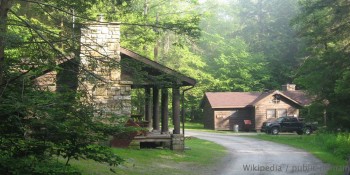The Modern Urban Gentleman is taking the urban to the wild this weekend. In what has become an annual event, a gathering of close friends will head to a cabin in the woods for a weekend of cooking, discussing, hiking, laughing, drinking, and Shadows Over Camelot-ing. It is an event to look forward to because it breaks the monotony of so-called “normal life,” for sure, but time in the wilderness also answers a call from deeper in the gentleman’s constitution.
The occasional weekend spent in nature is a necessity for a modern urban gentleman. The day-to-day reality of life introduces so many layers of artifice between the gentleman and the Homo sapiens at his core. To strip away that artifice for 48 hours is a refreshing, rejuvenating experience, offering a chance for a reset of the body and mind.
The urbanization of man is a phenomenon no more than two centuries old. The pressures of the agricultural and industrial revolutions pushed people closer together for financial sustainability. The rise of cities has sparked incredible achievements in architecture, art, business, literature, and countless other fields of human endeavor. On top of that, the vibe that defines big-city living is like a drug for many, the Modern Urban Gentleman included. Nonetheless, the human species did not evolve to live in Manhattan or Beijing. And evolution proceeds at far too slow a speed to allow humanity to have adapted to the environmental stressors of modern life.
Consider the most basic unnatural stressor introduced by modern technology: the light bulb. No one alive today remembers a world before the light bulb, but it was only the parents of our oldest great grandparents who lived in that much different time. The gentleman’s body operates on a natural cycle, the circadian rhythm, that depends on the input of external stimuli, such as the sun. For 200,000 years, less the last two centuries, the human machine has been calibrated to maximize sunlight and darkness.
Today, gentlemen are awash in the glow of artificial light at all hours: the evening television, the bedside lamp, and the smartphone game lulling us to shallow and unfulfilling sleep. The constant onslaught of light cues the brain to stay awake, awake, awake, even as the body slips into unconsciousness. The scientific evidence for the damage caused by the disruption of the circadian rhythm by artificial light is strong. We awake tired, stressed, irritable, and begin the day anew with the same disruption of the natural order.
A weekend in a cabin, while not free of artificial light, does allow for a resetting of the circadian rhythm. The early morning rays of sunshine streaming through cabin windows infuse campers with the energy to rise and light the breakfast fire. The setting sun dissipates the excitement, and campers crowd around that same fire for a hearty dinner, shared tales of bygone days, and a s’mores-induced moribundity that sends bleary-eyed ladies and gentlemen to a sound sleep.
Consider, too, the noise pollution of everyday life. Even if a gentleman does not live in an urban center, with traffic slicing along rain-soaked roads and pedestrians shouting to one another as they make their way home from the local watering hole, artificial sounds from television and microwave ovens and beeping washing machines and whirring cell phones replace the sounds of nature. The simple four walls of the gentleman’s house conspire to block the naturally calming auditory flow of Earth: birds chirping, of course, but also the subtle crunching of leaves as deer nose in the underbrush several hundred yards away, a river laps against the shore in the valley a mile below, and the wind rustles the blooming branches of a tall oak tree.
One of the most peaceful experiences the Modern Urban Gentleman has ever had was on a camping trip two years ago, rising before dawn and sitting in the utter blackness, listening and watching. In daylight, nary an animal could be found, but in the stillness of predawn, the unbroken chorus of forest whispers uncovered the overwhelming richness of fauna. The gradual, imperceptible lightening of the sky over the course of 90 minutes, from black to pink-tinged blue, was nothing short of miraculous.
Let’s not overlook the element of camaraderie engendered by a weekend cabin getaway. Humans may not have evolved to live in cities of millions, but they did evolve to be social animals. A monthly happy hour or an annual fantasy football draft only does so much to feed cravings for a band of brothers and sisters. Spending two or three days in a pack, like our long-gone ancestors, has a peculiar and wonderful effect on the soul.
The list of damaging everyday contrivances the modern urban gentleman endures goes on and on: processed foods, a sedentary lifestyle, spiritual vacuousness, astronomical illiteracy … As laid out in the introduction to this column two months ago, the modern urban gentleman “respects the earth and understands his instinctual connection to and dependence upon it.” It is a step — a long, arduous, everyday step — in our journey of self-improvement to minimize the interference between what we are and how we actually live. One simple way to be reminded of that charge is to step back for just a few days and truly experience what it is to be human.
